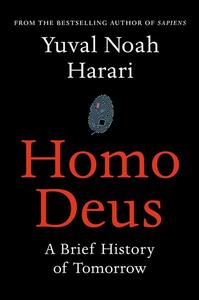Take a photo of a barcode or cover
informative
inspiring
medium-paced
informative
reflective
medium-paced
A good, but perhaps not excellent sequel to Sapiens. On occasion, it spends more time than it needs retreading concepts already established in Sapiens, but that does help to make this a suitable standalone for anyone that hasn't already read Sapiens.
Regarding whether this is worth a read, Harari's narrative style and the questions he poses (quite literally, as the book ends with "three key questions") make it engaging enough to stick through to the end (the first and final chapters were the most engaging, while the rest occasionally meandered, seeming at times unsure of where they were headed). If you're someone that already has read/is aware of/has spent time thinking about the impact of technology on humanity's medium-long term future, you'll probably get more out of Sapiens than Homo Deus; but even so, you may find that Homo Deus reframes your view on the subject in an (as of yet for you) novel way.
Regarding whether this is worth a read, Harari's narrative style and the questions he poses (quite literally, as the book ends with "three key questions") make it engaging enough to stick through to the end (the first and final chapters were the most engaging, while the rest occasionally meandered, seeming at times unsure of where they were headed). If you're someone that already has read/is aware of/has spent time thinking about the impact of technology on humanity's medium-long term future, you'll probably get more out of Sapiens than Homo Deus; but even so, you may find that Homo Deus reframes your view on the subject in an (as of yet for you) novel way.
challenging
informative
reflective
slow-paced
Because it was written in 2016 there’s a lot that I wish Harari would revisit after covid, the AI boom, etc. This book is eerie in its predications and dense for the casual reader. I don’t think I fully followed everything but it made me feel smarter
This book is incredible - will be coming back to this book a lot. Can’t reccomend enough
I had just finished his earlier book, Sapiens, and loved it. When I started reading this one I thought he is mostly repeating the earlier text, which is not so uncommon after a big hit, when the publishers try to convince the author to churn out another book while the iron is still hot, without much new to say. I was completely wrong. This book is full of equally intriguing and compelling ideas, if not more. Most books on the future of humankind dwells on technological extrapolations and then either rejoice the possibility of a fantastic future, or scare us with a dystopian image. This book stays mostly away from specific technological possibilities, but instead analyzes the current state of science and technology philosophically, and imagine where it might lead to. As in his earlier book, no cherished idea is sacrosanct, and he has the courage and intellectual curiosity to look at everything with the same dispassionate eyes of logic, be it capitalism, fascism, communism, or liberal humanism. It is a very refreshing book that forces us to look at familiar things with new and questioning eyes.
Yuval Noah Harari’s Homo Deus is a sweeping exploration of humanity’s past, present, and potential futures, delving into the ways our species has historically sought meaning and control through intersubjective systems. From gods to corporations to algorithms, Harari argues that these shared systems of belief have shaped civilizations by enabling collective cooperation and progress. However, as the data processing revolution accelerates, Harari warns that these paradigms could ultimately redefine what it means to be human.
One of the central threads in Homo Deus is Harari’s examination of intersubjective beings—entities like deities, nations, and corporations that exist only because of shared human belief. He traces the continuity between these constructs and highlights their evolving nature. Gods in ancient cultures unified societies, corporations in contemporary culture drive economies, and Harari sees information algorithms as the next dominant force shaping human life. What makes these beings powerful is not their intrinsic reality but their ability to inspire action and coordination.
Although Harari saw ancient gods are productive intersubjective beings, leading to coordinated action among those devoted to the god, he believed that such coordination to improve farming, irrigation, production, etc. are and were served more effectively through the nation and now through corporations. Harari critiques the resurgence of religious ideologies in the modern era by contrasting them with the capacity of successful ideologies to create new possibilities and foster innovation. For him, thriving ideologies inspire development rather than cling to the past. This insight resonates throughout his discussion of humanism, which he identifies as the dominant ideology of the modern era, and its potential obsolescence as dataism—an ideology centered on data processing—gains traction.
The emergence of data processing as a unifying scientific paradigm is the upshot of Harari’s argument. Harari suggests that understanding the world as a series of data flows will challenge core liberal values such as individualism, free will, and the intrinsic worth of humans. While dataism may initially align with humanistic goals by using algorithms to enhance human life, Harari predicts a stark divergence. Over time, he argues, humans could lose their central role in this paradigm, replaced by algorithms that render human agency irrelevant. In this vision of the future, intrinsic human value gives way to a contrast between the poor or weak masses and so-called “superhumans” who augment themselves through genetic manipulation and algorithmic dependence, leaving ordinary humans sidelined.
Harari acknowledges key unresolved tensions in his approach, which I found refreshing. For instance, he critiques the data processing paradigm for its devaluation of consciousness. He references Thomas Nagel’s famous essay, “What Is It Like to Be a Bat?” to highlight the limitations of understanding intelligence purely as information processing. The inability to account for subjective experience—the essence of consciousness—remains a glaring problem for dataism. Similarly, Harari gestures at the problem of other minds, which further complicates the relationship between human consciousness and algorithmic systems. A discussion of John Searle's Chinese room thought experiment would have been helpful here.
I also found it curious that Harari begins the book by emphasizing that intersubjective beings (like gods and corporations) are not “real,” since they depend on specific individuals acting within the system. Yet, as the book progresses, this skepticism seems absent when discussing the potential future dominance of algorithms. Are algorithms truly intersubjective beings if they operate independently of human input, or do they depend on human buy-in to maintain their power? This ambiguity felt like a missed opportunity for deeper reflection.
Homo Deus is an ambitious and thought-provoking work, and Harari’s insights into history and human cooperation are fascinating. And while his predictions for the future of dataism challenge readers to consider the implications of living in an algorithm-driven world, I wonder whether the vision he portrays is really attractive. It seems to devalue most things that are dear to me in life, including care for the well-being of others, human agency, striving for personal excellence, personal faith, and so forth. It's always interesting that those are precisely the characteristics most strongly correlated with human longevity, since suggests something is amiss with Harari's dataism.
One of the central threads in Homo Deus is Harari’s examination of intersubjective beings—entities like deities, nations, and corporations that exist only because of shared human belief. He traces the continuity between these constructs and highlights their evolving nature. Gods in ancient cultures unified societies, corporations in contemporary culture drive economies, and Harari sees information algorithms as the next dominant force shaping human life. What makes these beings powerful is not their intrinsic reality but their ability to inspire action and coordination.
Although Harari saw ancient gods are productive intersubjective beings, leading to coordinated action among those devoted to the god, he believed that such coordination to improve farming, irrigation, production, etc. are and were served more effectively through the nation and now through corporations. Harari critiques the resurgence of religious ideologies in the modern era by contrasting them with the capacity of successful ideologies to create new possibilities and foster innovation. For him, thriving ideologies inspire development rather than cling to the past. This insight resonates throughout his discussion of humanism, which he identifies as the dominant ideology of the modern era, and its potential obsolescence as dataism—an ideology centered on data processing—gains traction.
The emergence of data processing as a unifying scientific paradigm is the upshot of Harari’s argument. Harari suggests that understanding the world as a series of data flows will challenge core liberal values such as individualism, free will, and the intrinsic worth of humans. While dataism may initially align with humanistic goals by using algorithms to enhance human life, Harari predicts a stark divergence. Over time, he argues, humans could lose their central role in this paradigm, replaced by algorithms that render human agency irrelevant. In this vision of the future, intrinsic human value gives way to a contrast between the poor or weak masses and so-called “superhumans” who augment themselves through genetic manipulation and algorithmic dependence, leaving ordinary humans sidelined.
Harari acknowledges key unresolved tensions in his approach, which I found refreshing. For instance, he critiques the data processing paradigm for its devaluation of consciousness. He references Thomas Nagel’s famous essay, “What Is It Like to Be a Bat?” to highlight the limitations of understanding intelligence purely as information processing. The inability to account for subjective experience—the essence of consciousness—remains a glaring problem for dataism. Similarly, Harari gestures at the problem of other minds, which further complicates the relationship between human consciousness and algorithmic systems. A discussion of John Searle's Chinese room thought experiment would have been helpful here.
I also found it curious that Harari begins the book by emphasizing that intersubjective beings (like gods and corporations) are not “real,” since they depend on specific individuals acting within the system. Yet, as the book progresses, this skepticism seems absent when discussing the potential future dominance of algorithms. Are algorithms truly intersubjective beings if they operate independently of human input, or do they depend on human buy-in to maintain their power? This ambiguity felt like a missed opportunity for deeper reflection.
Homo Deus is an ambitious and thought-provoking work, and Harari’s insights into history and human cooperation are fascinating. And while his predictions for the future of dataism challenge readers to consider the implications of living in an algorithm-driven world, I wonder whether the vision he portrays is really attractive. It seems to devalue most things that are dear to me in life, including care for the well-being of others, human agency, striving for personal excellence, personal faith, and so forth. It's always interesting that those are precisely the characteristics most strongly correlated with human longevity, since suggests something is amiss with Harari's dataism.
challenging
dark
informative
reflective
tense
medium-paced
adventurous
informative
inspiring
tense
medium-paced
This book still holds up almost 10 years from its first publication. A must read for anyone who is bewildered by current state of politics, democracies and the world.
challenging
informative
slow-paced




